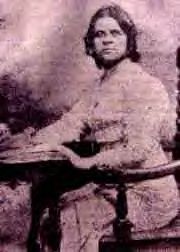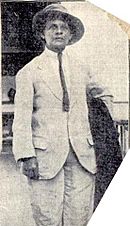Luisa Capetillo facts for kids
Quick facts for kids
Luisa Capetillo
|
|
|---|---|

Luisa Capetillo
|
|
| Born | October 28, 1879 Arecibo, Puerto Rico |
| Died | April 10, 1922 (aged 42) San Juan, Puerto Rico |
| Occupation | Writer, labor organizer |
| Nationality | Puerto Rico |
Luisa Capetillo (born October 28, 1879 – died April 10, 1922) was a very important leader in Puerto Rico. She worked hard for equal rights for women's rights and for all people to be free. She was a social organizer and a writer.
Contents
Early Life and Work
Luisa Capetillo was born in Arecibo, Puerto Rico. Her father, Luis Capetillo Echevarría, was from Spain. Her mother, Luisa Margarita Perone, was from Corsica. Both of her parents had very open-minded ideas about life and politics.
Luisa was taught at home by her parents. In 1898, she had her first child. She later had another child. She started working as a "reader" in a cigar factory in Arecibo. After the Spanish–American War, American companies took over many tobacco farms. These companies hired people to read books and news to the workers. This was how Luisa first learned about labor unions.
In 1904, Luisa began writing essays. These essays were called Mi Opinión (My Opinion). They shared her ideas and were printed in newspapers that supported workers' rights.
In her book Mi Opinión, she encouraged women to fight for fairness in society. She wrote:
Oh you woman! who is capable and willing to spread the seed of justice; do not hesitate, do not fret, do not run away, go forward! And for the benefit of the future generations place the first stone for the building of social equality in a serene but firm way, with all the right that belongs to you, without looking down, since you are no longer the ancient material or intellectual slave.
This book was one of the first important writings about the experiences of Latinas.
What Influenced Luisa
Luisa Capetillo's ideas were shaped by her parents, her surroundings, and the books she read. Her parents shared many similar beliefs, including those from the Romantic movement. Her mother believed women should stand up for their beliefs. She thought women should be free in their personal lives and challenge old rules.
Luisa's father, Luis, taught her how to read and write. She later wrote about her mother, saying she allowed her to think freely.
Luisa also developed her ideas about anarchism and romanticism from books. She read French writers like Victor Hugo and Émile Zola. She also read Russian writers like Leo Tolstoy. From these books, she learned that being natural in behavior could lead to a fair society. Tolstoy especially influenced her spiritual beliefs and writing. She even wrote a play called "Influencias de las ideas modernas" (The Influence of Modern Ideas), inspired by his ideas.
As an adult, Luisa chose not to follow the traditional Catholic Church. She believed that organized religion could limit people's freedom. She never had her children baptized. She wrote to her daughter, saying she didn't teach her to pray. Instead, she believed her daughter should feel it herself.
Luisa's Beliefs
Luisa Capetillo saw herself as both an anarchist and a spiritual person. In one essay, she wrote about how she could be both a Christian and an anarchist. She believed you didn't have to follow a specific religion to be a good person.
She taught her children to be kind and help others. She told her daughter that to be good, she didn't need to go to church. Instead, she could visit the poor, feed the hungry, and care for the sick.
Labor Leader and Women's Rights
In 1905, Luisa helped farm workers during a strike. She wrote flyers and organized the workers. By 1910, she became a reporter for the "FLT" (American Federation of Labor). She traveled all over Puerto Rico, teaching and organizing women. Her hometown, Arecibo, became a strong center for unions. She also started her own newspaper called La mujer (The Woman), which focused on women's issues.
Luisa started a program where she read to women working long hours in cigar factories. This is likely where she developed many of her ideas about feminism. In 1908, she asked the "FLT" union to support women's suffrage. This meant she wanted all women to have the right to vote, just like men. Luisa is known as one of Puerto Rico's first suffragists.
In 1912, Luisa traveled to New York City. There, she organized tobacco workers from Cuba and Puerto Rico. She then went to Tampa, Florida, and organized workers there too. In Florida, she published a second version of "Mi Opinión." She also visited Cuba and the Dominican Republic, joining workers in their strikes.
In 1919, Luisa did something very bold. She became the first woman in Puerto Rico to wear pants in public. At that time, this was seen as a "crime." She was arrested, but the judge later dropped the charges. She did this again when she arrived in Cuba, where she was not as lucky and had to spend time in jail. In the same year, she helped pass a law in Puerto Rico for a minimum wage.
Luisa's Legacy
Luisa Capetillo passed away on April 10, 1922, in Puerto Rico from tuberculosis. She is buried in the Municipal Cemetery of Arecibo.
In 1990, a TV movie was made about her. It was called "Luisa Capetillo, pasión de justicia" (Luisa Capetillo, passion of justice). In Arecibo, there is a non-profit organization called Casa Protegida Luisa Capetillo. It helps women who have been treated badly. The University of Puerto Rico, Cayey Campus also has a Luisa Capetillo Center of Documentation Hall. This center is part of a project to study women's issues.
On May 29, 2014, the Legislative Assembly of Puerto Rico honored 12 important women. They placed plaques for them in "La Plaza en Honor a la Mujer Puertorriqueña" (Plaza in Honor of Puerto Rican Women) in San Juan. Luisa Capetillo was one of these honored women.
See also
 In Spanish: Luisa Capetillo para niños
In Spanish: Luisa Capetillo para niños
 | Precious Adams |
 | Lauren Anderson |
 | Janet Collins |


